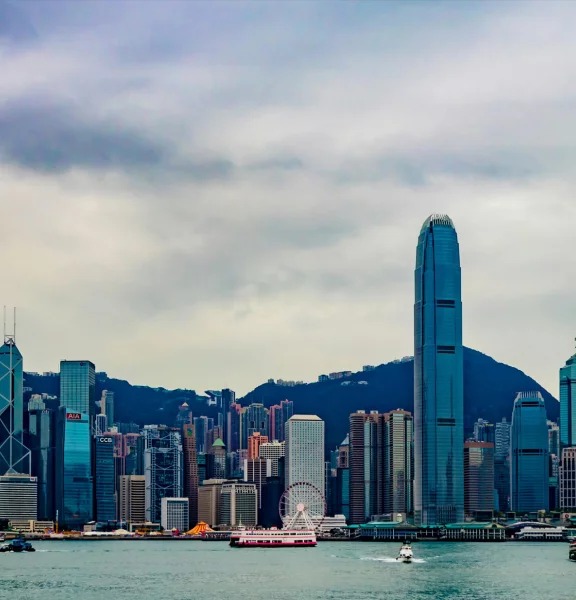Get your own personalized 360° MBA Ranking now.
Get a free consultation

International MBA students
Student satisfaction rate
Schools accredited by AACSB, AMBA or EQUIS
Average annual salary
Your guide to studying in Hong Kong
Candidates who want to study in Hong Kong will appreciate it not only as a place to learn and grow, but also as an exciting destination to live and work in. Several universities in Hong Kong are world-renowned for their MBA programs. As a student, you will also enjoy the fast-paced everyday life, the food culture, and the efficient public transport system. English is widely used here, so international students can easily fit in. Not to mention the impressive job opportunities that can open up for MBA graduates in this global financial hub. From the views atop Victoria Peak to the lively streets of Mong Kok, Hong Kong has unforgettable sights to offer.
Cultural Specifics of Hong Kong
Students and visitors in Hong Kong will notice the unique ways in which both Eastern and Western influences shape local culture and practices. The concept of “face” is very important and people prioritize maintaining dignity and avoiding public embarrassment. Communication is indirect, which means locals prefer to imply meaning than state what they want to say directly. Family and respect for elders are among the main pillars in Hong Kong society. For example, according to the dining etiquette, it is the elders that are always served first.
At the same time, some Western influences can be observed in Hong Kong’s culture – the legal system based on British common law, the widespread use of English in business and education, the popularity of Western cuisine and entertainment, and the adoption of some Western holidays and customs.
Business Culture in Hong Kong
As other cultural aspects in Hong Kong, the business setting is heavily influenced by both traditional Chinese values and Western practices. When doing business with locals, it is essential to first develop a trusting relationship with them before rushing into a deal. Always maintain a polite attitude when talking to colleagues or clients and adapt to a more formal communication style while getting to know each other. Professional meetings usually require a sharp dress code – dark suits for men and conservative attire for women.
In addition, business cards a popular way of making professional acquaintances, but make sure to use both hands when giving or receiving them. Yet thanks to Western influences, you will find that meetings and negotiations often take place in English, especially in international settings.
The experiences of students and alumni in Hong Kong
Podcast special from Unimy, Unimy and Beyond, and Prepadivser. How and why should you use culture to find your best MBA?
Interested in CEIBS, HKUST, or Indian School of Business? They have a lot to offer, so check out their admission requirements for 2022.
Advantages of the MBA programs in Hong Kong
The latest Financial Times MBA and EMBA rankings list 5 Hong Kong schools among the top in the world, recognizing their strategic locations and the significant advantages in networking and career opportunities they provide. Of the only 129 schools globally that hold the coveted Triple Crown accreditation, 1 university in Hong Kong is accredited by AACSB, EQUIS, and AMBA – a marker of high educational standards and international credibility.
Universities in Hong Kong have plenty of scholarship opportunities on offer for students who can show strong leadership potential. For example, HKUST and City University of Hong Kong have developed merit-based scholarships for outstanding applicants. There are also government loan schemes that can help with MBA financing, such as Hong Kong’s Extended Non-means-tested Loan Scheme (ENLS).
Hong Kong is well-known as a premier financial center, especially in the Asia-Pacific region. As a result, MBA graduates can conveniently access thriving industries, such as finance, consulting, and technology after studying in Hong Kong. Through the excellent career support services and mentorship programs available at local business schools, professionals can get ready to boost their career growth in the region. A great benefit is the fact that the Immigration Arrangement for Non-local Graduates (IANG) allows internationals to stay in Hong Kong without having secured an offer of employment first.
COMMON EXPENSES AND LEGAL ASPECTS
Cost of living
Rent of one-bedroom apartment in city center (monthly): HKD 18,083.33
Basic utilities (monthly): HKD 2,175.43
Public transport pass (monthly): HKD 500.00
Gym subscription (monthly): HKD 848.14
Water (1.5-liter bottle): HKD 12.52
Source: Numbeo
Visa requirements and work permits
International students will need a student visa to be able to do their MBA in Hong Kong. When applying for one, they have to provide an admission offer from a recognized institution, proof of financial means, and a valid passport. From there on, the Immigration Department of Hong Kong handles the application process. Students who wish to work part-time during the academic year can do so up to 20 hours per week (or full-time during holidays), although there are specific conditions. After completing their MBA, graduates may be able to get a work visa through Hong Kong’s Immigration Arrangements for Non-local Graduates (IANG).
FEATURED SCHOOLS IN Hong Kong



Available programs:
Explore the most popular MBA programs in Hong Kong
You might also be interested in...
Request a consultation
Get a free consultation with our expert advisors and discover the MBA that best suits your profile and aspirations.
